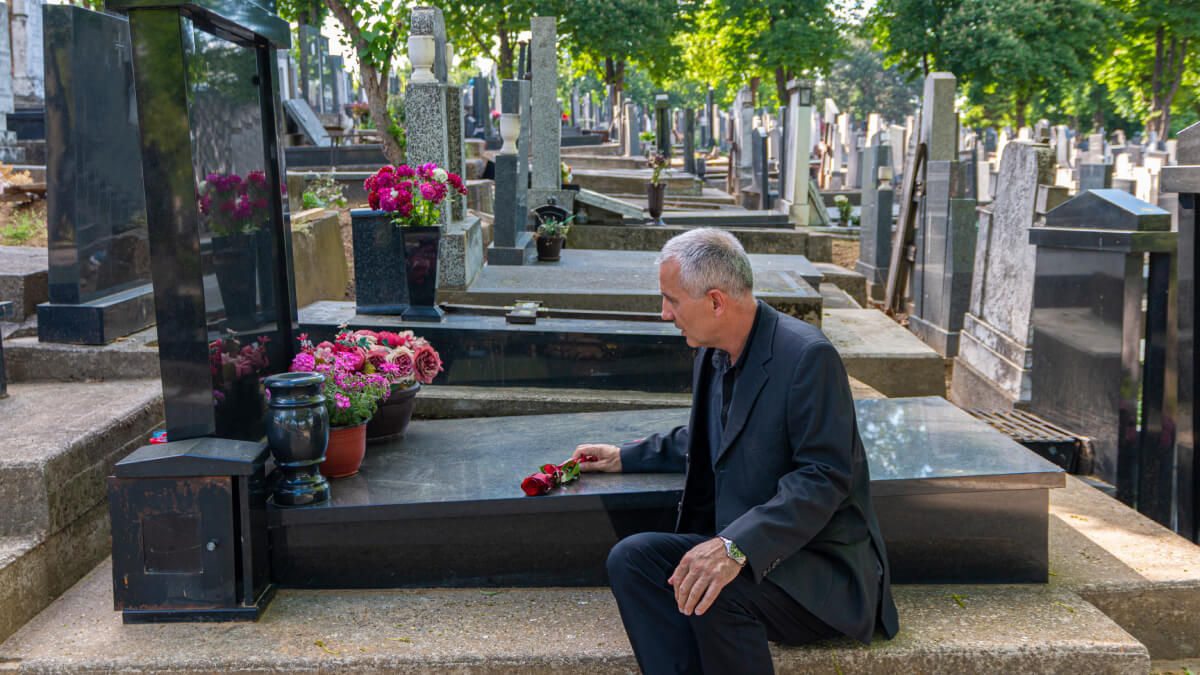Grief is one of the most painful emotions we experience as humans because it’s felt after someone or something we love is taken away from us. It’s a universal experience, yet it can feel incredibly isolating when you’re going through it. The weight of loss can be overwhelming, and the intensity of the emotions can catch you completely off guard.
Grief can take many forms and look very different from person to person. Some people cry openly, whilst others become withdrawn and quiet. Some feel angry, others feel numb. There’s no right way to grieve, and it’s even natural to feel guilty about how you might choose to process your loss. You might worry that you’re not grieving “enough” or that you’re taking too long to “get over it.”
Understanding that grief is a natural process – not something to be fixed or hurried through – can be incredibly helpful when you’re struggling with loss. This article will help you better understand grief and provide guidance on how to support yourself and those around you in dealing with grief.
For additional mental health guidance and to connect with qualified professionals who understand the complexities of grief, the LADZ app offers resources and support specifically designed to help you through challenging times.
A Guide To Dealing With Grief
The impact of grief extends much further than many people realise. It’s not just an emotional experience – grief affects your entire body and mind. Research from UCLA Health suggests that grieving can have a negative impact on your immune system, making you more susceptible to illness and infections. Grief can also affect your sleep, appetite, concentration, and energy levels in ways that might surprise you.
The goal of this article isn’t to rush the grieving process or provide a quick fix for emotional pain. Instead, we want to help you understand what you or a loved one might be feeling so you can manage the experience with greater awareness and self-compassion. Grief is not a problem to be solved – it’s a natural response to loss that deserves patience and understanding.
- Understanding Grief
- Symptoms Of Grief
- Types Of Grief
- What Are The 5 Stages Of Grief?
- How To Support Someone With Grief

Understanding Grief
Grief is the body’s natural reaction to loss, and it serves an important purpose in helping us process and adapt to significant changes in our lives. While the most common way grief manifests is as intense emotional pain or sadness, it can take on many different forms depending on the person and the nature of the loss.
Most people associate grief with the death of a loved one, and this is certainly one of the most profound forms of loss we can experience. Grief can occur after the loss of a family member, a close friend, a pet, or any important figure in your life – anyone you felt connected to and cared about. The depth of grief often reflects the depth of the relationship and the significance that person held in your life.
However, it’s important to understand that you can also grieve the loss of something rather than someone. Major life changes like losing a job, ending a relationship, moving away from a place you love, or even changes in your health or abilities can trigger grief responses. You might grieve the loss of dreams that didn’t work out, phases of life that have ended, or even versions of yourself that no longer exist.
What makes grief so complex is that it’s not just about sadness. Grief encompasses a wide range of emotions and reactions, and these can change from moment to moment. You might feel relief mixed with guilt, anger alongside love, or numbness when you expected to feel devastated. All of these responses are normal and valid parts of the grieving process.
Understanding that grief is both universal and deeply personal can help you approach your own experience with more patience and self-compassion. There’s no timeline for grief, no “correct” way to feel, and no pressure to move through it at any particular pace.

Symptoms Of Grief
Grief is a very personal experience that impacts everyone differently, but there are some common symptoms that many people experience. Recognising these symptoms can help you understand that what you’re feeling is normal and part of the natural grieving process.
- Intense Sadness: This is often the most recognisable symptom of grief—a deep, aching sadness that can feel overwhelming.
- Longing For What Has Been Lost: You might find yourself yearning for the person, relationship, or situation you’ve lost.
- Numbness: Sometimes grief presents as emotional numbness or feeling disconnected from your usual feelings.
- Anxiety: Loss can create significant anxiety about the future, other potential losses, or your ability to cope.
- Confusion: You might find it difficult to concentrate, make simple decisions, or remember things you normally wouldn’t forget.
In addition to emotional symptoms, grief often manifests physically:
- Sleep Problems: You might have trouble falling asleep, staying asleep, or you might find yourself sleeping much more than usual.
- Changes To Your Appetite: Some people lose their appetite entirely during grief, while others find themselves eating much more than usual.
- Physical Health Problems: Grief can manifest as headaches, stomach problems, muscle aches, or a general feeling of being unwell.
The NHS recognises that grief can have significant physical impacts and recommends monitoring your physical health during the grieving process.

Types Of Grief
Grief is very complex and, as mentioned previously, can be experienced in many different ways. Understanding that there are different types of grief can help normalise your experience and reduce any worry that you might be grieving “incorrectly.” Grief can be broken down into several different types:
Anticipatory Grief
This refers to grieving before an actual loss occurs. For example, if someone you love has been diagnosed with a terminal illness, you might begin grieving while they’re still alive. Anticipatory grief can sometimes help prepare you emotionally for the eventual loss, but it’s important not to let it prevent you from making the most of the time you still have together.
Abbreviated Grief
This sometimes follows anticipatory grief and means you move through the grieving process relatively quickly. If you experience abbreviated grief, it doesn’t mean you didn’t truly care about what you lost or that your feelings weren’t genuine. We all grieve on different timelines, and some people are able to process and integrate loss more quickly than others.
Delayed Grief
It’s common to begin experiencing the full emotional impact of grief days, weeks, or even months after the loss occurs. Delayed grief often happens after you’ve finished handling the immediate practical matters that come with loss, such as arranging funerals, dealing with wills, or managing other responsibilities. Once these tasks are complete, the emotional reality of the loss may hit more fully.

Inhibited Grief
This refers to suppressing or repressing the emotions associated with grief, often because someone hasn’t been taught how to recognise or process these intense feelings. Inhibited grief can result from family or cultural backgrounds that discourage emotional expression. When grief is inhibited, it often manifests through physical symptoms like insomnia, digestive problems, or panic attacks.
Cumulative Grief
This occurs when you’re grieving multiple losses at once, which makes the grieving process more difficult and complex. The losses might be related – such as losing a job and then a relationship – or completely separate events that happen close together in time.
Collective Grief
Collective grief happens when we grieve as a group or society. This occurs during wars, following natural disasters, terrorist attacks, or global events like the COVID-19 pandemic. As a community, we grieve shared experiences and collective losses. This type of grief can feel both isolating and connecting – isolating because of the magnitude of the loss, but connecting because it’s a shared experience.

What Are The 5 Stages Of Grief?
The five stages of grief come from Elisabeth Kübler-Ross’s groundbreaking book “On Death and Dying,” published in 1969. Despite being written over 50 years ago, it remains one of the most effective resources for understanding the grieving process. In her research, Kübler-Ross interviewed over 200 people with terminal illnesses and identified five common stages that people experience as they come to terms with facing death.
It’s crucial to understand that these stages are not rules or strict phases that everyone must experience in order. They’re more like emotional areas that people might visit during their grief journey. You might experience some stages but not others, go through them in a different order or revisit the same stage multiple times.
Denial
This is often the first response to loss – a refusal to accept the reality of what’s happened. Denial can serve as a psychological buffer, allowing you to absorb the shock of loss gradually rather than all at once. You might find yourself thinking “this can’t be real” or expecting the person you lost to walk through the door as if nothing has happened.
Anger
As the reality of the loss begins to sink in, anger often emerges. You might feel angry at the person who died for leaving you, angry at yourself for things you did or didn’t do, angry at medical professionals, or even angry at friends who still have what you’ve lost. This anger is a natural part of processing loss and doesn’t make you a bad person.
Bargaining
During this stage, you might find yourself trying to negotiate with a higher power, fate, or even with yourself. Common thoughts include “If only I had done this differently” or “I would give anything to have them back.” Bargaining represents an attempt to regain control in a situation where you feel powerless.
Depression
As you begin to understand the full reality and permanence of your loss, you might experience deep sadness and depression. This isn’t the same as clinical depression, though it can sometimes develop into that. This stage involves truly feeling the weight of what you’ve lost and can be one of the most difficult phases to navigate.
Acceptance
Acceptance doesn’t mean being “okay” with the loss or feeling happy about it. Instead, it means acknowledging the reality of the situation and beginning to find ways to move forward while carrying the loss with you. Acceptance allows you to reinvest in life while still honouring what you’ve lost.

How To Support Someone With Grief
Supporting someone who’s dealing with grief can feel overwhelming, especially if you’re worried about saying or doing the wrong thing. However, it’s so important to let grieving people know that you’re there to support them, even if you don’t have all the answers. Remember that you don’t need to fix their pain – just being present and showing you care can make a real difference.
Understanding that everyone grieves differently is crucial when offering support. What comforts one person might feel intrusive to another, so it’s important to be patient and follow their lead about what feels helpful. Here are a few tips to help you support someone dealing with grief:
- Acknowledge What Has Happened: It might feel difficult, but don’t stay silent about their loss. Many people worry that mentioning the loss will remind the grieving person of their pain, but the reality is they haven’t forgotten – they’re thinking about it constantly.
- Consider The Best Way To Contact Them: Use your understanding of the person to figure out how they’d prefer to be contacted during their grieving process. Some people appreciate phone calls because they crave human connection, while others might prefer text messages because they don’t feel ready for conversation.
- Talk About What They’ve Lost: If they feel comfortable doing so, don’t be afraid to talk about the person or thing they’ve lost. Many grieving people worry that others will forget about their loved one or that mentioning them will become taboo. Sharing positive memories, asking about their relationship, or simply saying the person’s name can be incredibly meaningful.
- Focus On Their Experience: While it’s natural to want to share your own experiences with loss, try to keep the focus on their unique situation. Saying things like “I know exactly how you feel” can actually feel dismissive, even when well-intentioned. Instead, acknowledge that you can’t fully understand their specific pain but that you’re there to support them through it.
Charities like Cruse Bereavement Care offer additional guidance and resources for both those experiencing grief and those supporting them through the process.

Find Support With LADZ
Grief is one of life’s most challenging experiences, but understanding its stages, symptoms, and various forms can help you navigate this difficult journey with greater self-compassion. Remember that there’s no “right” way to grieve, no timeline you need to follow, and no pressure to “get over” your loss quickly.
Whether you’re currently dealing with grief yourself or supporting someone who is, the most important thing to remember is that you don’t have to face this alone. Grief can feel incredibly isolating, but reaching out for support – whether from friends, family, or professionals – is a sign of strength, not weakness.
For ongoing support, practical guidance, and access to mental health professionals who understand the complexities of grief and loss, the LADZ app offers resources specifically designed to help you through life’s most challenging moments.




